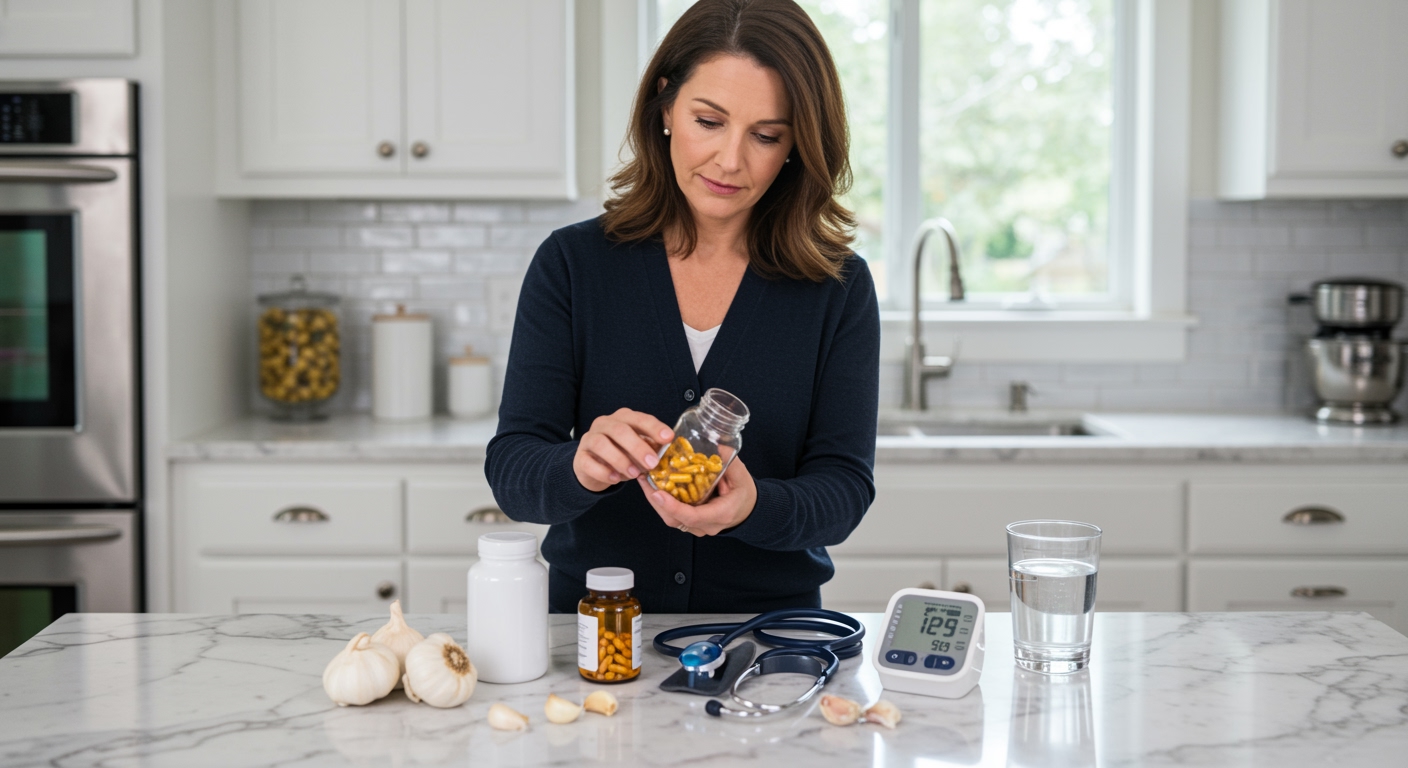✪ Key Takeaway: Garlic supplements show modest blood pressure reduction in studies but fresh garlic provides better results with fewer risks.
Introduction
Your doctor just told you that your blood pressure numbers are creeping up, and now you are staring at rows of garlic supplements in the pharmacy aisle.
You have heard that garlic can help with blood pressure, but you wonder if these convenient capsules actually work or if you are just wasting your money on another health fad.
Hi, I am Abdur, your nutrition coach, and today I am going to explain everything you need to know about garlic supplements for blood pressure, including what the research actually shows and whether you should choose pills or fresh garlic.
What Does Research Say About Garlic Supplements?
Multiple studies have examined garlic supplements for blood pressure control, and the results show modest benefits that might surprise you.
A comprehensive analysis of 12 clinical trials found that garlic supplements reduced systolic blood pressure by an average of 8.4 mmHg and diastolic pressure by 7.3 mmHg in people with high blood pressure.
These reductions are meaningful but not dramatic, roughly equivalent to what you might see from reducing sodium intake or losing 5-10 pounds of body weight.
The active compound responsible for these effects is allicin, which forms when garlic is crushed or chopped and helps relax blood vessel walls.
However, many garlic supplements contain very little active allicin because this compound breaks down quickly during processing and storage.
Studies that showed the best results used aged garlic extract or supplements specifically designed to preserve allicin content, not the cheap garlic pills you find at discount stores.
✪ Fact: Most garlic supplements lose 80% of their allicin content within six months of manufacturing.
How Much Garlic Do You Need For Blood Pressure Benefits?
The dosage question is where things get tricky because supplement labels often do not tell the whole story about what you are actually getting.
Studies showing blood pressure benefits typically used doses equivalent to 600-900 mg of garlic powder daily, which equals about 2-3 fresh garlic cloves.
However, the key is not just the amount of garlic but the amount of active allicin that your body can actually use.
Fresh garlic produces about 2.5-4.5 mg of allicin per gram when properly crushed, but most supplements provide much less because allicin is highly unstable.
Some supplement manufacturers try to solve this problem by using allicin precursors or aged garlic extract, which may be more stable but work through different mechanisms.
The timing of when you take garlic supplements also matters because stomach acid can destroy allicin before it reaches your bloodstream.
Enteric-coated supplements that dissolve in your intestines rather than your stomach may provide better results, though they cost more than regular capsules.
✪ Pro Tip: Look for supplements that specify allicin yield or allicin potential rather than just garlic powder content.
Are There Safety Concerns With Garlic Supplements?
Garlic supplements are generally safe for most people, but they can cause unexpected problems that you should know about before starting.
The most common side effects include stomach upset, heartburn, and that unmistakable garlic breath that can persist even with odorless supplements.
More concerning is that garlic supplements can increase bleeding risk by affecting platelet function, which is the same mechanism that provides cardiovascular benefits.
If you take blood thinning medications like warfarin or even daily aspirin, garlic supplements could amplify these effects and lead to excessive bleeding.
Some people also experience allergic reactions to garlic supplements, ranging from skin rashes to more serious respiratory symptoms.
High doses of garlic supplements may also interact with certain medications used for HIV treatment and could potentially reduce their effectiveness.
The lack of regulation in the supplement industry means that garlic products can vary wildly in quality, purity, and actual garlic content between different brands and even different batches.
✪ Note: Always consult your doctor before adding garlic supplements if you take any prescription medications.
Should You Choose Fresh Garlic Or Supplements?
Fresh garlic consistently outperforms supplements in research studies, and the reasons go beyond just allicin content.
When you crush or chop fresh garlic and let it sit for 10-15 minutes before cooking, you maximize allicin formation and give your body the most active compounds.
Fresh garlic also provides additional beneficial compounds like sulfur-containing amino acids and antioxidants that work together with allicin for cardiovascular health.
The process of eating fresh garlic as part of meals means slower absorption and potentially fewer digestive side effects compared to concentrated supplements.
However, getting therapeutic amounts of fresh garlic daily can be challenging because you would need 2-3 cloves per day, which many people find difficult to tolerate.
If you choose supplements, look for aged garlic extract products that have been specifically tested for blood pressure benefits in clinical trials.
The best approach might be combining both: using fresh garlic in your cooking regularly and supplementing only when you cannot get enough from food sources.
✪ Pro Tip: Crush fresh garlic and let it rest before cooking to maximize allicin formation and health benefits.
The Bottom Line
Garlic supplements can provide modest blood pressure benefits, but they are not a magic solution and work best as part of a comprehensive approach to cardiovascular health.
Real health improvements come from consistent daily choices, not from hoping that one supplement will solve complex health problems, and garlic works best when combined with other proven strategies like regular exercise, stress management, and a balanced diet.
I would love to hear about your experiences with garlic for blood pressure or any questions you have about choosing between fresh garlic and supplements, so please share your thoughts in the comments below.
References
At NutritionCrown, we use quality and credible sources to ensure our content is accurate and trustworthy. Below are the sources referenced in creating this article:





